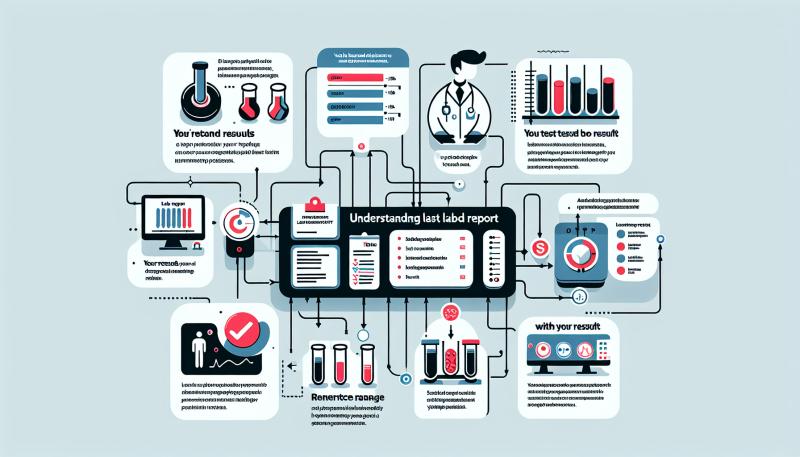
Lab Tests: Understanding Your Results
Understanding Your Lab Test Results: A Comprehensive Guide
As an individual consumer, making sense of your lab test results can often be daunting. Whether it's a routine check-up or a specific diagnostic test, deciphering those numbers, abbreviations, and medical terminology can be challenging. This guide aims to demystify the world of lab tests, offering you a clearer understanding of your results so you can take charge of your health with confidence.
What Are Lab Tests?
Laboratory tests, commonly known as lab tests, are medical procedures that involve testing samples of blood, urine, or other tissues to get insights into a person's health. They are critical tools used by healthcare providers to diagnose diseases, monitor conditions, and evaluate the effectiveness of treatments.
Types of Common Lab Tests
- Complete Blood Count (CBC): This test evaluates overall health and detects a variety of disorders, such as anemia, infection, and leukemia, by measuring different components of blood, including red and white blood cells, hemoglobin, and platelets.
- Basic Metabolic Panel (BMP): The BMP checks essential metabolic functions and measures levels of blood glucose, calcium, and electrolytes. It's often used to evaluate kidney function.
- Lipid Panel: This test measures cholesterol levels, including LDL and HDL cholesterol and triglycerides, and is an essential tool for assessing heart disease risk.
- Thyroid Panel: The thyroid panel evaluates the function of the thyroid gland by measuring hormone levels like TSH, T3, and T4.
- Urinalysis: Urinalysis evaluates different substances in the urine and helps diagnose conditions such as urinary tract infections, kidney disease, and diabetes.
Understanding Your Results
When you receive your lab test results, they typically include several components:
- Reference Range: This is the range of values typically seen in healthy individuals. It serves as a benchmark to interpret whether your result is normal or requires further attention.
- Units: Lab results are reported in various units, depending on what is measured. Ensure that you compare your values within the correct units as per the report.
- Flags or Alerts: Important indicators highlight abnormal results that may require follow-up or further testing by your healthcare provider.
It’s critical to remember that "normal" ranges can vary due to factors like age, sex, and medical history. Thus, it is vital to discuss your results with a healthcare provider who can interpret them in the context of your overall health and medical history.
Why Lab Test Results May Vary
- Biological Differences: Gender, age, height, weight, and genetic background can influence test outcomes.
- Medication: Prescribed drugs, including over-the-counter medications and supplements, can alter test results.
- Living Habits: Exercise, diet, alcohol, and tobacco use are lifestyle factors that may impact your test results.
- Pre-test Preparation: Not adhering to pre-test instructions such as fasting can lead to skewed results.
How to Discuss Your Lab Results With Your Healthcare Provider
Discussing your lab results with your healthcare provider can offer significant insights into your health status. Here's how to make the most of your consultation:
- Prepare Questions: Write down any questions you have about the test or potential diagnoses. Understanding terms like "high," "low," "positive," or "negative" within your test context is crucial.
- Contextual Inquiry: Ask how your results compare with typical reference ranges and what that might mean for your health.
- Impact of Lifestyle: Inquire about how lifestyle factors might have influenced your results and any lifestyle modifications that might benefit your health.
- Follow-up Actions: Understand any next steps, whether it's monitoring, further testing, or treatment plans.
The Role of Lab Tests in Preventive Healthcare
Lab tests are not just diagnostic tools; they play a crucial role in preventive healthcare. Regular screenings and tests can help in early detection and prevention of diseases. For instance, regular blood pressure checks, cholesterol level tests, and screenings for blood glucose levels can provide early alerts to cardiovascular risks, metabolical disorders, and diabetes, ultimately helping to guide timely intervention and management.
Choosing a Reliable Lab Testing Service
When it comes to choosing a laboratory service for testing, consider factors such as:
- Accreditation: Ensure the lab is accredited by a recognized body ensuring quality and reliability in test results.
- Turnaround Time: Factor in how quickly test results are processed and reported back to you or your healthcare provider.
- Accessibility: Consider the ease of accessing lab locations, or if at-home collection services are offered.
- Technology: A technologically equipped lab can offer a broader range of tests and precise results writing.
Here is where IMS Screening Solutions comes into play, a trusted entity accessible online at imsscreenings.com. They provide comprehensive lab testing services aimed at empowering individuals with timely, reliable, and efficient health insights.
Conclusion
Interpreting lab test results doesn't have to be an overwhelming process. With a basic understanding of what these tests measure, how to read results, and discussions with your healthcare providers, you can gain significant insights into your health. Whether it's routine check-ups or specific diagnostic tests, lab results are pivotal in painting a clearer picture of your overall well-being, empowering you to make informed decisions about your health trajectory.
